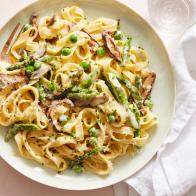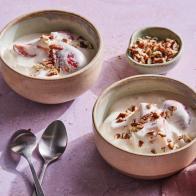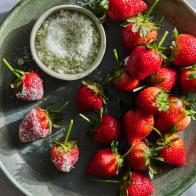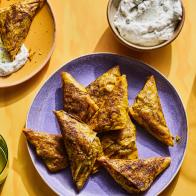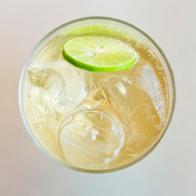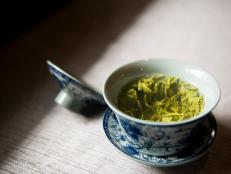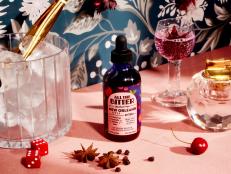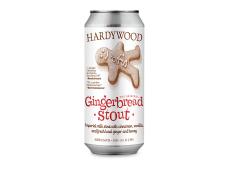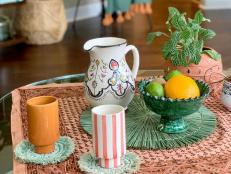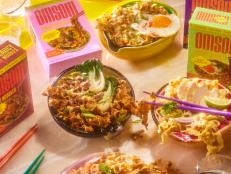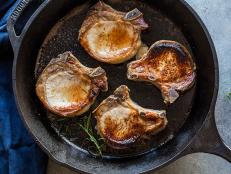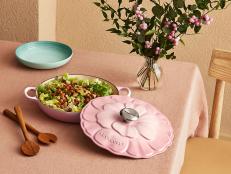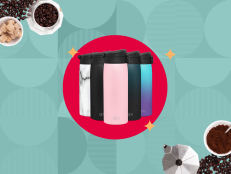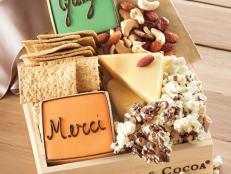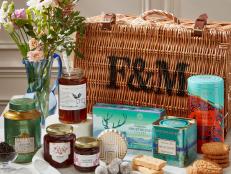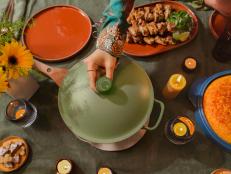9 Teas Experts Wish More People Knew About
Branch out from that black Lipton bag.

Photo courtesy of The Qi
Tea is a historically significant drink, with origins rooted in a myriad of cultures, from South America to Britain stretching over to Africa and Asia. There are so many noteworthy varieties out there, but many people in the U.S. share the same default definition of tea: black or green and often comes in a Lipton tea bag. And who’s to blame for this tunnel vision? This drink duo leads the way on grocery store shelves, big-name café menus and it’s easy to become overwhelmed by choice at a specialty tea shop without the proper knowledge or recommendation. That’s why we checked in with tea sommeliers, authors, food writers and other experts to learn about the unique tea varieties they drink all the time and wish more people knew about. From roasted brews to herbal teas, try these when you put together your next cup.
"Hojicha is a Japanese roasted green tea and it’s my absolute favorite. As a Korean American, I grew up on roasted teas so it’s not surprising to love the toasty, nutty flavors of hojicha. Because it’s roasted, it has less caffeine than other green teas. Most green teas can easily get bitter if not steeped properly, but it’s very easy to make hojicha without it getting astringent. Hojicha is great hot, without any milk or sugar, as a tea latte, and it's so refreshing when cold brewed in the summer."
- Jee Choe, certified tea sommelier and blogger of Oh, How Civilized
"Growing up in Mumbai, the only tea I knew was CTC black tea — brewed hard and fast into the daily cups of chai that power nearly a billion people everyday with an alchemy of tea, milk, sugar and spices. Moving to the Bay Area, I discovered the world of light, aromatic and downright ethereal oolongs from the folks at Song Tea, who source their teas from China and Taiwan with the same care and commitment to quality that we source our spices with. Now, I’m so deeply attached to their Taiwanese Shan Li Xi Winter Sprout oolong’s sweet, caramel and spicy notes that I pack my tea in my suitcase with the same necessity as a toothbrush!"
- Sana Javeri Kadri, CEO and founder of Diaspora Co.
"Most in the West have never experienced the depth and breadth of the tea category that is oolong. From the greener, buttery Jade Oolongs from Taiwan, to the dark, sweet Wuyi Oolongs of China, this tea category contains hundreds of tea styles that are as diverse as they are delicious. When introducing folks to the world of loose leaf, pure teas, this is my favorite category due to the surprised reactions I typically get."
- Tony Gebely, founder of Tea Epicure and author of The Philosophy of Tea and Tea: A User’s Guide
"In Chinese culture, tea is not restricted to the caffeinated ones like green tea. Lots of herbal tea blends are brewed in Chinese households as a popular wellness practice called 'Yang Sheng 养生,' which means 'nourishing life.' Some common herbal ingredients for tea include goji, jujube dates, Angelica root and chrysanthemum. An example of these herbal blends is this Superwomen Tonic Bag. Whole herbs are brewed for about 15 minutes and taken warm."
- Zoey Xinyi Gong, traditional Chinese medicine chef and nutritionist
"Drinking burdock root tea brings me back to my grandparents' house, sitting on the floor with my aunts while they cut up fruit and gossip. Although not considered a traditional tea, burdock root deserves all the attention for its distinct nutty, earthy, aromatic flavors that Asian families have enjoyed for generations. Made from the dried root of the burdock plant, this delicious tea is caffeine-free. I love to enjoy it hot or iced, reconnecting with my family’s and culture’s roots with every sip. Burdock root tea is readily found in many Asian grocery stores, but you could also visit your local rice cake store that may dry and slice the root themselves."
- Hannah Bae, founder of Halmi Beverages
"A favorite of mine that I feel deserves more attention is white tea. Many American tea drinkers are used to the bolder, more bitter flavors of brisk black teas and coffee. White tea does not get as much attention as green, but has a distinctly floral, sweeter and more mild taste without any of the grassy notes that can turn some new tea drinkers away from green teas. White teas make great afternoon cups, as their more delicate flavors are a great pick-me-up and they have less caffeine than green or black. Bai Hao Silver Needle is a classic Chinese white tea, and is harvested by only picking the top, unopened buds of the tea plant, which produces a smooth and sweet vegetal infusion."
- Tara Sussman, store manager of Sullivan Street Tea & Spice Company
"Yerba mate is honestly an ethereal find as far as teas go. It’s an herbal tea but also produces enough caffeine for a boost! I prefer tea straight, no-sugar-chaser, and I love that yerba mate shines all on its own. It is super refreshing and crisp without any added sugar cubes or milk. Serve it up hot, at room temperature or chilled over ice, with a hit of citrus from the juice of a lemon wedge to make for a magical morning. Trust me, the extra citrus notes will make the ephemeral joy of tea sipping last all day. Or is that just the caffeine?"
- Jessica Delph, recipe developer
"Yaupon tea has a long and complicated history, but offers those of us here in central Texas a local, caffeinated drink that we find in our own backyards. Yaupon has been a source of caffeine in Indigenous communities for at least 1,000 years, but now foragers, herbalists and environmentalists alike are looking to this plant for its multifaceted benefits. Despite its long history in the rituals of Native American communities, it was once forgotten as a drink for ‘poor, rural communities who could not afford to import traditional Chinese tea.’ After experiencing the sixth most devastating wildfire in U.S. history, the people behind Lost Pines Yaupon are working to restore the habitat of the endangered Houston Toad and repurpose Yaupon harvesting as an important agroecological tool that supports all beings and our planet. Whether you buy or forage it, I love that this tea offers a natural, non-jittery source of caffeine to get us through our busy days while connecting us closer to our local flora and fauna that support us every day!"
- Ari Diaz, food writer
"A tea that’s little-known in the West but that I think deserves more attention is kabuse (ka-boo-say) sencha, also known as kabusecha from Japan! Now, this isn’t your regular sencha, the green tea that makes up about 80% of tea produced in Japan. Kabusecha or 'covered tea' means the tea leaves have been shaded with a dark tarp for 1-2 weeks before harvest. This shading makes the leaves produce chlorophyll-rich leaves and the umami taste that Japanese teas are so famous for! The same shading is used to produce gyokuro (three weeks) and tencha (3-4 weeks) which gets ground into the bright green matcha powder you’re probably familiar with. Kabusecha is a sweet spot between worlds, as it has much of the same ‘umami’ as gyokuro or matcha, but with a little less intensity that makes it easier for everyday drinking, or for a newcomer to green teas."
- Mel Hattie, certified tea sommelier and blogger of Mel Had Tea
"Chrysanthemum tea has always been my go-to beverage when I have dim sum. Made from the dried buds of the chrysanthemum flower, its mild, floral flavor goes down very well with the rich and oftentimes greasy dumplings and fried foods my family and I love! You can buy packets of instant chrysanthemum tea (usually already sweetened) and boxed drinks at Asian markets, but I prefer buying the dried buds and steeping them myself. I also like to mix and match my own herbal concoctions using chrysanthemum, jujubes, rose petals, goji berries and/or lavender. Next time you go for dim sum, ask for ju hua cha (菊花茶)!"
- Patricia Tanumihardja, four-time cookbook author and blogger of Pickles and Tea
Editor’s Note: Quotes have been edited for clarity and brevity
Shop Teapots
Related Content:
